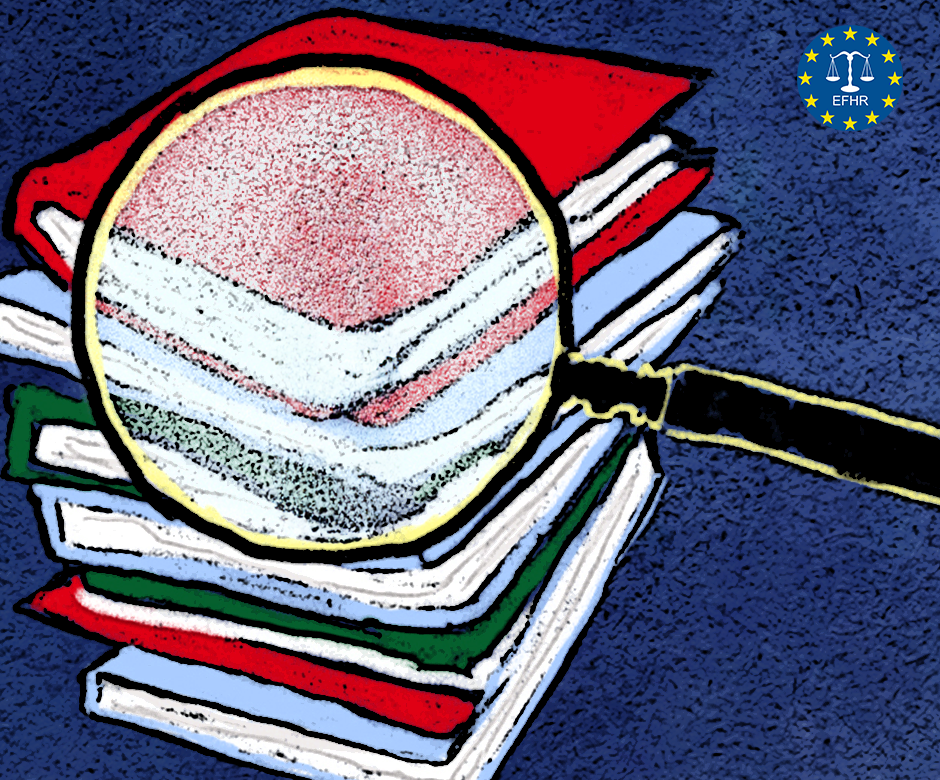- 2014/08/05
Original spelling of names and surnames is a problem for all Lithuanian citizens

 The Right to the original spelling of name and surname constitutes one of the core rights of every citizen. The possibility of proper usage of the law and respecting it should be unconditionally provided by each and every country. The European Foundation of Human Rights (EFHR) would like to remind all that the European Court of Human Rights (ECtHR) has emphasized that regulating the spelling of names and surnames poses a liability for every member country and, moreover, it is closely connected with culture, linguistic history and a sense of identity.
The Right to the original spelling of name and surname constitutes one of the core rights of every citizen. The possibility of proper usage of the law and respecting it should be unconditionally provided by each and every country. The European Foundation of Human Rights (EFHR) would like to remind all that the European Court of Human Rights (ECtHR) has emphasized that regulating the spelling of names and surnames poses a liability for every member country and, moreover, it is closely connected with culture, linguistic history and a sense of identity.
According to the ECtHR, if similar names are already registered and have no negative impact upon maintaining cultural and linguistic identity, the national authorities have no reason to refuse the registration of a particular name or surname. The same goes with their subsequent change as well.
However, according to the current Lithuanian law, preserving the original form of name and surname poses a fairly discernible problem. This case is not only applicable to the names and surnames of the national minority group representatives willing to name their children in accordance with their culture, tradition or language. It also poses a difficulty for the remaining citizens of Lithuania, in particular to women marrying foreigners and wishing for their surnames to be written in the same way as the surnames of their husbands on documents issued in Lithuania. Nonetheless, no civil registry will agree to such an undertaking.
The biggest number of lawsuits regarding the change of either name or surname is constituted by those Lithuanian women aiming to change their surname to that of their foreign husbands with the preservation of the original spelling (no Lithuanian endings added). According to the data, this problem concerns a substantial number of people since annually, as many as 16% of marriages are of a mixed character. Further, within ten years, the number of children born beyond the borders of the country has increased from 1% to 16% (2011). Such marriages and the resulting offspring want their family name to be written in its unchanged form in all documents issued within Lithuanian borders.
Yet another hindrance is encountered by people with their surnames including a two-letter combination, i.a. rz, sz, cz, tt and nn (e.g. MATTHEW, EWA, BROWN, POWELL, MATTHEO, VITTE, SZCZERBA, KACZOR, LESZCZYNSKA, CZESLAV). With respect to the data provided by the Residents’ Registry Service under the Ministry of the Interior (Gyventojų registro tarnyba) upon the EFHR’s request, over 8000 names and surnames including combinations of such letters have already been registered in Lithuania. Yet, despite the inscriptions confirming the registration of such names and surnames in Lithuania, people are refused any changes. What is also quite common is situations, in which people choosing a new passport (the previous one having expired) are made to cross out the double letters from their surname regardless of their presence in the previous document.
In addition to this, there are cases of Lithuanian women going abroad e.g. for educational or professional reasons who, after some time, apply to have their names changed due to various difficulties encountered in their temporary place of residence. For instance, a person named ”Ana”, in order to avoid further (e.g. administrative) complications is willing to have it transformed into ”Anna” because in a given country even her original name ”Ana” is written with double ”n”. Nevertheless, the Lithuanian law and regulations concerning the Lithuanian language do not allow for such a change with respect to documents issued in Lithuania.
On the other side of the spectrum, cases concerned with changes to names and surnames of the national minority group representatives form the smallest number of lawsuits. These are the ones referring to e.g. writing the names with usage of ”w” and ”rz”. However, according to the regulations concerned with the Lithuanian language, the implementation of such changes is forbidden. As a result, people are obliged to Lithuanianize their names and surnames written in accordance with the Latin alphabet, which means they become deprived of their identity and culture, e.g. the name of ”Kazimierz” being written as ” Kazimiež”.
All the aforementioned examples prove that every Lithuanian citizen may encounter some hindrances concerned with the original spelling of names and surnames. The country, without changing the current law, exposes its own citizens to numerous, not only administrative difficulties – e.g. the constant necessity to explain to children why their surnames are different from those of their parents. EFHR hopes that the Lithuanian laws will soon be changed as this would enable the name and surname to be written according to a person’s will and their sense of identity. Furthermore, EFHR reminds all that our lawyers provide free-of-charge legal advice concerning the change of name/surname, help to fill in request of change forms and, once the application has been unjustifiably refused, to issue an official complaint.
Contact details of the Foundation as well as a list of the necessary documents with examples are to be found at: www.efhr.eu
EFHR



